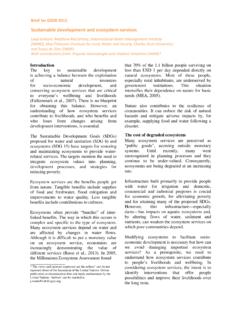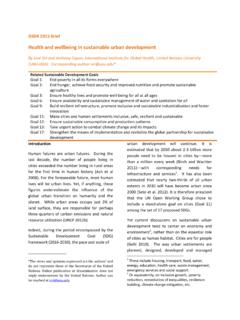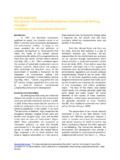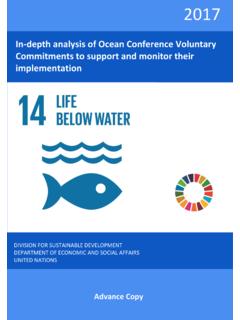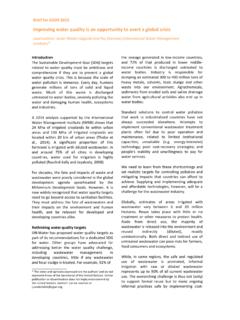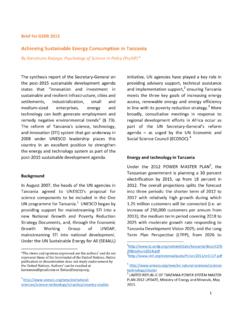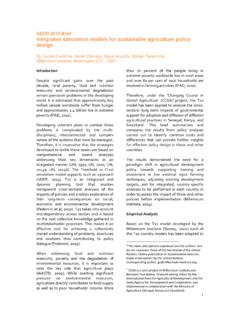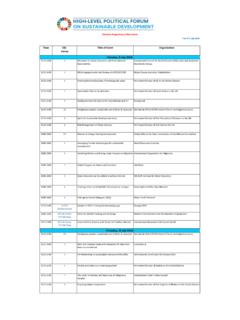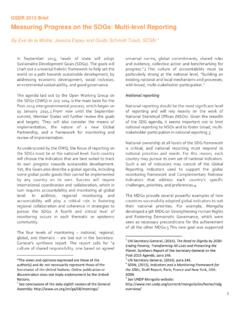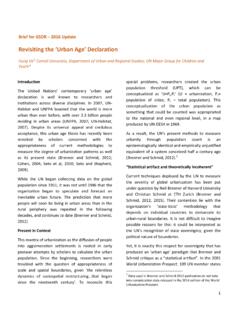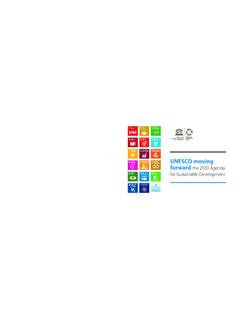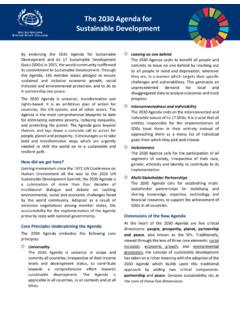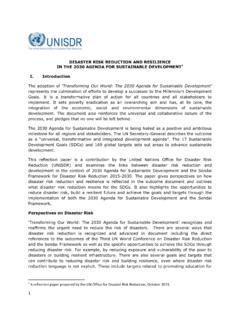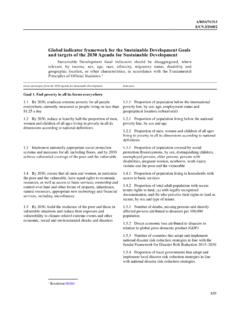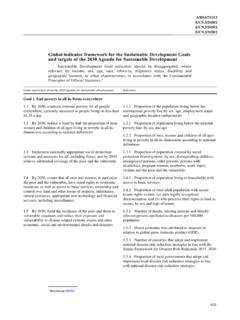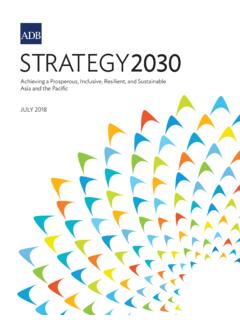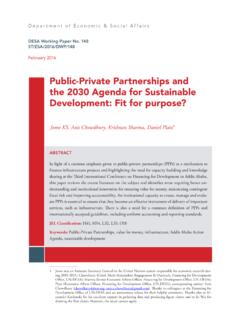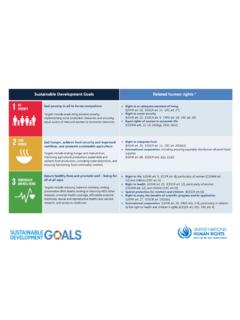Transcription of INCLUSIVE INSTITUTIONS FOR SUSTAINABLE …
1 Chapter 4. | INCLUSIVE INSTITUTIONS for SUSTAINABLE development | 61 INCLUSIVE INSTITUTIONS FOR SUSTAINABLEDEVELOPMENT4 CHAPTERThe new agenda recognizes the need to build peaceful, just and INCLUSIVE societies that provide equal access to justice and that are based on respect for human rights (including the right to development ), on effective rule of law and good governance at all levels and on transparent, effective and accountable Transforming our world: the 2030 agenda for sustainable development . Resolution adopted by the General Assembly on 25 September IntroductionThe 2030 agenda calls for transparent, effective, INCLUSIVE and accountable INSTITUTIONS to advance poverty eradication and SUSTAINABLE development .
2 It aims to ensure responsive, INCLUSIVE , participatory and representative decision-making at all levels, emphasizing the importance of public access to information, protection of fundamental freedoms and the promotion of non-discriminatory laws and policies for SUSTAINABLE Institution is a broad and multi-faceted term, which encompasses a range of structures, entities, frameworks and norms that organize human life and society. While INSTITUTIONS are certainly not the only means to reduce inequalities, INCLUSIVE INSTITUTIONS are critical enablers of equity and are central to achieving the objective of leaving no one behind.
3 The 2030 agenda does not prescribe institutional models for the national level, but outlines principles that INSTITUTIONS should strive to achieve, such as effectiveness, inclusiveness, and accountability (SDG 16), responsive, INCLUSIVE , participatory and representative decision-making at all levels (target ) and policy coherence (target ). 62 | Global SUSTAINABLE development Report 2016 Different scientific disciplines view INSTITUTIONS through various perspectives. From outcomes of cognitive processes in the form of mental representations that are context-dependent (time and space) and domain-specific,2 to sets of rules and INSTITUTIONS are supported by beliefs that facilitate their dissemination and their rules are inserted in hierarchical, power relationships between Formal INSTITUTIONS include written constitutions, laws, policies, rights and regulations enforced by official authorities.
4 Achieving any particular target under the SDGs will require a combination of factors, including: legal, regulatory components; multiple INSTITUTIONS intervening at various levels; and potentially broader societal changes, in social norms, which themselves can be spurred by changes in INSTITUTIONS . For example, the advancement of gender equality requires a range of actions at all these levels, and the intervention of a range of INSTITUTIONS with different mandates and purposes. In other words, no target related to inclusiveness can generally be achieved through a single institution.
5 Conversely, individual INSTITUTIONS , especially those with broad mandates, can contribute to inclusiveness in many different areas as well as society-wide. For such INSTITUTIONS , it is important to assess both how INCLUSIVE they are, and how they foster inclusiveness through their actions. Among the many types of INSTITUTIONS that should be examined due to their importance in fostering inclusiveness, this chapter examines how two specific types of INSTITUTIONS , national councils for SUSTAINABLE development (NCSDs) and national parliaments, have helped promote inclusiveness in relation to the achievement of SUSTAINABLE development .
6 While the choice of these two types of INSTITUTIONS , among many others, is illustrative, both NCSDs and parliaments are important INSTITUTIONS for SUSTAINABLE development . Efforts to promote SUSTAINABLE development at the national level have attempted to address challenges related to integrated decision-making by encouraging the establishment of multi-stakeholder and cross-sectoral national These mechanisms are broadly referred to as National Councils for SUSTAINABLE development (NCSDs). In turn, parliaments have played an important role and will be crucial for the 2030 agenda implementation.
7 The 2030 agenda acknowledges the essential role of national parliaments through their enactment of legislation and adoption of budgets and their role in ensuring accountability for the effective implementation of our commitments , but also in inclusiveness in drawing on contributions from indigenous peoples, civil society, the private sector and other stakeholders .6 Through law-making and budgets, parliaments can ensure inclusiveness and hold governments accountable for their policies on ensuring to leave no one chapter draws on existing studies and reviews across countries and regions.
8 Synthesizing lessons that could guide countries efforts to adapt their institutional frameworks as they embark on the journey to implement the new INCLUSIVE INSTITUTIONS for SUSTAINABLE DevelopmentUseful lessons for strengthening INSTITUTIONS to advance SUSTAINABLE development can be learned from the efforts made to implement the outcomes of the first Conference of Environment and development in Rio de Janeiro, Brazil, in 1992, the World Summit on SUSTAINABLE development in Johannesburg, South Africa, in 2002 and the Conference on SUSTAINABLE development (Rio+20) in Rio de Janeiro, Brazil in 2012.
9 For example, by definition, SUSTAINABLE development requires an integrated approach to decision-making, incorporating social, environmental and economic dimensions. Since 1992, the integrated nature of SUSTAINABLE development has posed challenges to INSTITUTIONS that were often not designed to work across boundaries. Scholars have tried to address these challenges with various concepts, such as horizontal integration,7,8 boundary-spanning,9 strategic public management,10 and of informal INSTITUTIONS are (the usually unwritten) social norms, customs or traditions that shape thought, attitudes and ,13 Formal and informal INSTITUTIONS structure the distribution of opportunities, assets and resources in society.
10 For example, political settlements establish the formal rules for managing political and economic relations (such as electoral processes, constitutions, and market regulations), as well as the informal division of power and are different types of INSTITUTIONS , depending on the domains they organise: those governing the reproduction of society notably individuals life-cycle, memberships and statuses15 and those regulating interactions, exchanges ( , codes of conduct), in various domains ( , political, economic, social). Economic relations, political governance and social norms within families and communities are key institutional domains influencing development outcomes.
